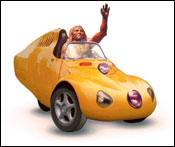WE THINK WE’RE so different. So much greener than the rest of the country, so caring about the environment, so eager to preserve the natural beauty that surrounds us. But the automotive truth may not quite square with the ecological self-perception. What’s the best-selling General Motors vehicle in Seattle? The sensible Cavalier sedan, perhaps, that gets 26 miles per gallon in the city? Course not; it’s the full-size Chevy Silverado pickup, which manages about 14 mpg and has the lowest possible score (1 out of 10) on the EPA’s environmental ranking of new vehicles (see epa.gov/autoemissions). The Silverado outsells any other GM car in this city by almost 3-1, says a company spokesperson. “That’s consistent with sales throughout the nation.” And you thought we were special!
Yet in other ways, Seattle car culture really is as distinct as we imagine. Our obsession with all-wheel-drive Subarus, for instanceboxy and practical, sporty and spaciousis borne out by sales figures. Seattle is the No. 1 market for Subaru of America, despite being only 10th in population size (as the company defines it). Greater Seattle drivers buy Subarus4,902 of them last yearat a rate three times that of the nation as a whole. No wonder you can’t ever find yours in the PCC parking lot; which Forester with the rainbow bumper sticker is it? And Subaru was ranked second (behind Honda) as the manufacturer of the least-polluting cars in a year-2000 study by the Union of Concerned Scientists and the American Council for an Energy-Efficient Economy (ACEEE!). But don’t get too complacent, Suby lovers. According to the AMES Awards, a Michigan organization that rates cars and trucks for environmental performancefuel efficiency, tailpipe emissions, and future degradationthe 2003 Legacy and Outback are actually poorer choices than such d飬ass頒enton-esque vehicles as the Oldsmobile Alero and the Pontiac Grand Am. Stick that in your Yakima roof rack and smoke it.
IT’S A MIXED BAG of automotive indicators for Chief Seattle, wherever he is, whatever he’s driving. Notwithstanding perpetual backups on the I-5 Ship Canal Bridge, local car proliferation is actually under controlwe don’t need more garages. According to Northwest Environment Watch, there are about 86 registered vehicles per 100 residents in Washington, and that number has held pretty steady over the past decadeeven through the tech boom. (Ever-enlightened Vancouver, B.C., of course, has only 70 vehicles per 100 persons.) But our vehicles are more and more likely to be gas-gulping SUVs and light trucks, which, according to Jim Hammond, head of the Puget Sound Auto Dealers Association, are “the biggest sellers by a long shot,” bearing out GM’s figures.
Indeed, Hammond says the biggest gas hogs of all, luxury SUVs, saw more sales growth, percentagewise, in the Puget Sound area last year than in the country at large. Weirdly enough, we seem to have a preference for the Cadillac Escalade over the Hummer (which tops the Caddy in this category elsewhere). Could the Sonics perhaps be single-handedly skewing the results?
And despite the hype, the greener, groovier gas-electric hybrids from Toyota and Honda are showing mixed results. Last year, national sales of the Honda Insight dropped by half from what they were in 2001, its first model year. And so far in 2003, sales are off by another thirdonly 611 purchased in the entire U.S.possibly a sign that the two-seat model needs to be revamped and upsized.
The larger, more practical Prius from Toyota has been doing far better: Last year sales were up by 30 percent over 2001, with more than 20,000 sold. And in King County, dealers sold 120 of the Prius hybrids in the first quarter of this year. (By comparison, Ford sold 2,216 vehiclesmostly SUVs and truckshere during just the first two months.) Yet Seattle isn’t even among the top five markets for electric and hybrid vehicles, according to a report from automotive consultants R.L. Polk. California, which has much tighter emission regulations, and a state-backed clean-car sales mandate (since repealed), has proven to be a better market so far.
WHAT ABOUT VOLVO, that mossy icon of Northwest car culture? Does our Scandinavian heritage make us a unique market? Well, yes and no. Seattle/Tacoma ranks only 12th among Volvo’s U.S. markets, according to the company. But our taste in Volvos is rather distinct. Nationwide, Volvo’s best-selling model is the BMW-like S60 sedan (which is currently being advertised on TV as offering “performance when you need it,” as a young woman blasts her way past a couple of trucks on the freewayso much for “Drive Safely”). Last year, Volvo sold twice as many S60s (about $34,000) as any other model. But in Seattle, the S60 is outsold by the boxier, homelier, more all-around family-and-dog-and- outdoors-oriented XC70 wagon (aka the “Cross Country”; about $39,000). It gets worse gas mileage than the S60, but has a better pollution score from the EPA.
So is that what Chief Seattle would be tooling around in today, an all-wheel-drive, ground-hugging import wagon with kayaks on the roof, tapping his fingers to NPR? Well, maybe. Then again, that just might have been him in the Grand Cherokee cutting you off on the West Seattle Bridge.








